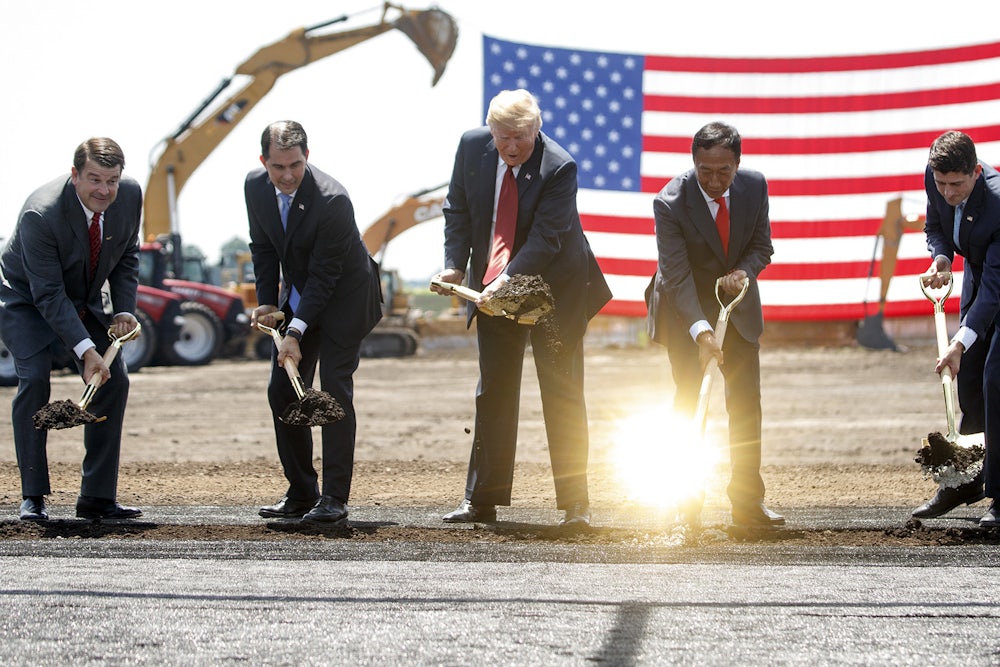In June, Donald Trump traveled to Mount Pleasant, Wisconsin, for the groundbreaking ceremony of the Taiwanese electronics company Foxconn’s new manufacturing plant—a 20 million-square-foot complex that state officials say will create 13,000 jobs for southeastern Wisconsin over the next 15 years.
By the time Trump visited the site, however, those claims were already in doubt. Wisconsin Governor Scott Walker, a Republican, had offered Foxconn CEO Terry Gou nearly $3 billion in tax credits and exemptions to move his company to the state. But Wisconsin won’t get any of that money back until 2042, only breaking even then—according to a report released by the state’s Legislative Fiscal Bureau last August—if Foxconn gives all 13,000 jobs to Wisconsin residents. Thus far, the company has only committed to 3,000. And it has reneged on these kinds of promises before. In 2013, the company said it would hire 500 workers and spend $30 million on a plant in Harrisburg, Pennsylvania, and then never built it.
Lavish, lousy incentive deals aren’t unusual. These packages rarely influence corporate executives; CEOs tend, instead, to look for good infrastructure and skilled labor when selecting a new location. According to research by Timothy Bartik at the W.E. Upjohn Institute for Employment Research, tax incentives only change their minds between 2 and 25 percent of the time. When companies come to town, unemployment tends to stay where it was. Economic growth doesn’t ramp up. Big corporations nab about 90 percent of government incentive dollars, leaving small businesses almost nothing. And often, all that’s left is a big hole in the state budget.
This math is familiar—and yet, incentive packages have tripled since 1990. Thanks to blockbuster deals like Foxconn and the beauty pageant underway for Amazon’s second headquarters, which drew a whopping $7 billion bid from New Jersey and an offer from Fresno, California, to give Amazon joint control over where the city spends its tax dollars, incentive packages could double over the next five or ten years, reaching $100 billion annually, according to Bartik. Politicians, under pressure to show voters that they’re creating jobs, are increasingly reaching for the flashy choice: cutting checks to corporations that are all too happy to take them. And so far they haven’t faced a reckoning.
America’s first tax incentive package was in 1791, when New Jersey convinced Alexander Hamilton to move his manufacturing company to the state. These schemes wouldn’t become widely popular, however, until after World War II, when Southern states—hoping to transition their economies away from agriculture by luring manufacturers from the North—began offering companies tax breaks.
Despite all the evidence that these deals don’t work, they have remained popular with elected officials. It’s easy to strike them and even easier to claim political credit for them. “A company comes and they have a ribbon-cutting ceremony—that’s a way to show as an individual you are the deal maker,” said Nathan Jensen, co-author of Incentives to Pander: How Politicians Use Corporate Welfare for Political Gain. These deals often last years, even decades; the politicians who brokered them are usually safely out of office once the fiscal damage becomes apparent.
BIGGEST CORPORATE INCENTIVE PACKAGES:
Boeing:
$8.7 billion (from Washington, 2013)
Alcoa:
$5.6 billion (from New York, 2007)
Foxconn:
$4.8 billion (from Wisconsin, 2017)
Boeing:
$3.2 billion (from Washington, 2003)
GM:
$2.3 billion (from Michigan, 2009)
That is why politicians can get away with offering $62 million to Marriott to convince it to move its headquarters just five miles down the road, as Maryland did in 2016, even though two years earlier, neighboring Virginia had given a Chinese industrial ceramics manufacturer called Lindenburg Industry LLC more than a $1 million to build an air pollution device factory in Appomattox County—only to discover that the company was a fraud. (It had used a fake website to get the funding and then pocketed it without hiring a single resident.)
Often, voters don’t realize that they are the ones who suffer the most from these deals. In Texas, for example, public schools have lost $4 billion to Governor Gregg Abbott’s Office of Economic Development since 2002. New Jersey and Michigan face billions in liabilities. And even when politicians try to halt tax incentives, companies seem to find a way to keep getting them. In 2015, Illinois Governor Bruce Rauner, facing almost $9 billion in debt, imposed a moratorium on new economic incentives. Then ConAgra Foods, the agricultural giant with headquarters in Nebraska, told state officials that it would move its offices to Chicago, if it got the kind of incentives that were at the time prohibited. So state officials tacked $10.5 million in tax breaks onto a previous request, even as they were forced to close museums, withhold funding for nonprofits, and stop doling out lottery payments. (ConAgra’s CEO later said the incentives had nothing to do with the move.)
There are better ways to jump-start local economies. Aaron K. Chatterji of Duke’s Fuqua School of Business has proposed creating a Main Street Fund to support states that invest in choices that are smarter than incentives. Those could be seed money for startups, services to help businesses scale up, or a focus on attracting particular kinds of businesses, as Amy Liu of the Brookings Institution has suggested. But first, cities and states would have to cease offering big bucks to big business.
Ultimately, these deals aren’t just about corporations looking to get a windfall where they can. It’s politicians, too, who, through their desire for a quick and easy win, end up robbing their constituents of money that could be much better spent elsewhere.
